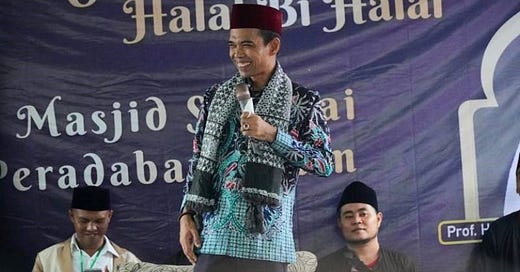Singapore’s status as a majority Chinese island in a Malay Muslim sea has come into sharp focus after the city-state barred a firebrand Indonesian cleric from entry, causing demonstrations in Indonesia among his followers and threats against Singapore. The Singapore government disqualified the 45-year-old Abdul Somad Batubara and six family members and associates on May 16 and deported them to the Indonesian island of Batam, 30 km across the Strait of Malacca.
Somad called on the Singaporean ambassador to Indonesia to explain to the public why the party had been deported, adding that their documents were completed and eligible for entry. The visit, he said, was “not for teaching or tabligh akbar (mass gathering).” He was then brought to a 2x1-meter ‘detention room, he told local media, and kept for about three hours before being returned on that day's last ferry.
The action kicked off mass demonstrations in front of the Singaporean embassy in Jakarta and the country’s consulate in Medan as Somad’s followers threatened violence. More demonstrations ensued on May 23 in Jakarta. The websites of two Singaporean companies have also been defaced and the social media accounts of Prime Minister Lee Hsien Loong and President Halimah Yacob have been spammed, authorities said.
“This guy is a hate monger,” said a western observer in Singapore. “He is barking mad. You might even say good for Singapore. He has a big flock in Indonesia. He is trying to incite his followers to cause trouble.”
An observer in Jakarta told Asia Sentinel the demonstrations are “one of the interesting phenomena in Indonesia today, where some Muslims are becoming very fanatical about certain Muslim figures, as has happened to Somad and Islamic Defender cleric Muhammad Rizieq Shihab. Their words are like ‘the word of God’ to them. And those figures are always defended even when it's wrong.
Somad, the source said, is part of the so-called 212 group that sought the ouster of Christian governor Basuki Tjahaja Purnama of Jakarta in 2017 and engineered his jailing on charges of blasphemy. “Admiration for Somad is a residue of religious exploitation in the 2017 Jakarta gubernatorial election.”
In a chilling message quoted by authorities, Somad’s followers said they seek to destroy Singapore and would work to expel the Singaporean ambassador in Jakarta, threatening to send the followers of the particularly thuggish Indonesian Islamic groups, the Islamic Defenders and the Prosperous Justice and Ulama Defenders “ to attack your country like 9/11 in 2001” – the attack on the World Trade Center in New York -- “and we will also expel people from Singapore who live in Indonesia.”
In a video, Somad charged that Singapore “actually belongs to the Malays” and that Singaporeans or other races are only immigrants. "In the future, God willing, the time will come, perhaps in the era of our grandchildren, the ones who will be in power are the Malays and that country shall be conquered back, so they will feel the pain, impudent.” According to local media, he also urged "all Indonesians [to] take a piss together and channel it towards Singapore, the island will sink.”
He thus echoes a longstanding, if fanciful, argument that the island should belong to what had been an indigenous population of ethnic Malays. When the island was settled by Sir Stamford Raffles in 1819, the population, according to histories, consisted of roughly 120 ethnic Malays and 30-odd Chinese. As a British crown colony and a free port, Singapore’s need for a skilled workforce and laborers attracted large numbers of impoverished Chinese to the island to the point where, under the British, they came to dominate the population and the economic heights.
According to official government figures, ethnic Malays’ monthly median household income from work per household member was US$1,594 in 2020, compared with US$2,603 for the Chinese and US$2,521 for Indians, who make up 9 percent of the population. The country has the highest per capita income in Asia, with Singaporean Malays earning considerably more than their counterparts in either Malaysia or Singapore.
Singapore’s status first as a British colony and later a Chinese-dominated state, especially as it prospered far beyond them, has long attracted envy and irritation from Indonesia and Malaysia to the point where modern Indonesia’s founding leader Sukarno conducted open war against the colony and what was then the Federation of Malaya for three years in the 1960s.
That led Singapore to adopt what was called a “poisoned shrimp“ strategy, building elite armed forces that, while the island might be swallowed by numerically superior forces, would inflict enormous damage on the attackers. At one point, Singapore, with a population then of about 2.5 million, had a larger combat aircraft force than Malaysia and Indonesia together, with a combined population then of about 170 million people. Its military preparedness remains in place today despite the relatively amicable relations between the three countries.
Samad, from North Sumatra, is a lecturer at the Sultan Syarif Kasim II State Islamic University in Riau, the Indonesian state directly across the strait from Singapore’s gleaming skyscrapers. He has been barred not only from Singapore but Hong Kong, East Timor, the Netherlands, Germany, and the United Kingdom for views that, according to Singaporean government figures, include a claim that suicide bombing attacks are legitimate, that “infidel spirits” known as jinns live on crucifixes, that Muslims shouldn’t travel in Red Cross ambulances with crucifixes, that Muslims shouldn’t accept non-Muslims as their leaders, given that he says non-Muslims could conspire to oppress Muslims.
“These are just some examples,” K Shanmugam, Minister for Home Affairs and Minister for Law, told local reporters. “. You know, if someone said this in Singapore, Internal Security Department (ISD) will be visiting him or her, and they will be behind bars. So the language, the rhetoric, as you can see, is very divisive – completely unacceptable in Singapore.”
The Indonesian government, Shanmugam said, has been deeply supportive of Singapore’s action in expelling the cleric.




